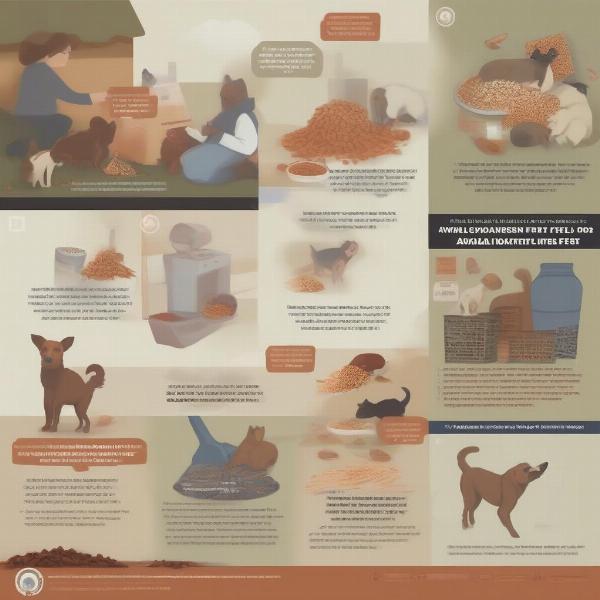The question “do cattle eat dog and cat parts?” is a disturbing one, raising concerns about the safety of pet food and the potential for disease transmission. While it’s an unpleasant topic, it’s important to understand the facts and address any potential risks. This article will explore the regulations surrounding animal feed, the potential dangers of cattle consuming pet remains, and what pet owners can do to protect their furry companions.
What’s in Cattle Feed? Regulations and Reality
Cattle are herbivores, meaning their digestive systems are designed to process plant matter. Their diet primarily consists of grasses, hay, and grains. However, cattle feed can also include byproducts from various industries, including the food processing industry. These byproducts are often used as a cost-effective way to supplement cattle diets with additional nutrients. Regulations vary worldwide, but in many countries, including the US, strict regulations govern what can be included in animal feed. These regulations are designed to prevent the spread of disease and ensure the safety of the food chain.
The Risk of Disease Transmission
One of the primary concerns about cattle consuming pet remains is the potential for disease transmission. Diseases like mad cow disease (BSE) have been linked to the practice of feeding cattle animal byproducts contaminated with infected tissues. While regulations are in place to prevent this, the possibility remains a concern. Furthermore, other diseases can be transmitted through contaminated feed, posing a risk to both cattle and humans who consume beef products.
What Pet Owners Can Do
 Pet Owner Responsibilities Regarding Animal Feed
Pet Owner Responsibilities Regarding Animal Feed
As responsible pet owners, we can take steps to minimize the risk of our pets’ remains entering the animal feed chain. Proper disposal of deceased pets is crucial. Cremation is generally considered the safest option, ensuring that remains are completely destroyed. If burial is chosen, it’s essential to bury the pet deep enough to prevent scavenging. Additionally, securing pet food and preventing access by other animals, including wildlife, can help prevent the unintentional spread of disease.
Advocating for Change
Pet owners can also advocate for stricter regulations on animal feed and support organizations working to improve animal welfare. By staying informed and raising awareness, we can contribute to a safer and more ethical food system for both animals and humans.
Conclusion
The question of whether cattle eat dog and cat parts is complex and raises important concerns about animal welfare, food safety, and disease transmission. While regulations are in place to mitigate these risks, responsible pet ownership and continued advocacy are crucial for ensuring the well-being of our pets and the integrity of our food supply.
FAQ
- Are there regulations on what can be included in cattle feed? Yes, many countries have strict regulations regarding animal feed ingredients to prevent disease transmission.
- What is the safest way to dispose of a deceased pet? Cremation is generally considered the safest method.
- Can diseases be transmitted through contaminated animal feed? Yes, diseases like BSE and others can be spread through contaminated feed.
- How can I advocate for safer animal feed practices? Support organizations working to improve animal welfare and contact your local representatives to express your concerns.
- What are the primary ingredients in cattle feed? Cattle primarily eat grasses, hay, and grains, sometimes supplemented with byproducts from the food processing industry.
ILM Dog is a leading international online resource for dog owners, dedicated to providing expert advice and information on all aspects of dog care. From breed selection and puppy care to senior dog health and training tips, we offer a wealth of resources to help you provide the best possible care for your furry companion. We also specialize in dog nutrition, grooming, and finding the right products and accessories for your dog’s unique needs. For expert advice tailored to your dog, contact us at [email protected] or call +44 20-3965-8624. Visit ILM Dog for more information.